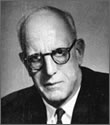William Bosworth Castle (1897 - 1990)

William Bosworth Castle was one of the founding fathers of experimental hematology. His pioneering work on the pathogenesis of pernicious anemia and other red cell disorders was matched by his leadership and mentoring of two generations of academic hematologists.
Castle considered himself fortunate to be "in the right place at the right time." He was richly endowed both by nature and by nurture. His father, William Earnest Castle, was professor of zoology at Harvard and one of the pioneers of mammalian genetics. His younger brother, Edward, was a professor of physiology at Harvard.
Throughout his career, William Castle's prime motivating impetus was to be "a doctor in direct contact with the object of his endeavors: the sick man, woman, or child1." His humanitarian impulse forged a strong linkage with an abiding zeal for science. While an intern at Massachusetts General Hospital in 1921, he fell under the spell of George Minot, an exemplar of meticulous clinical investigation who was awarded the Nobel Prize in Medicine for his discovery of liver treatment of pernicious anemia (PA). Continue reading...